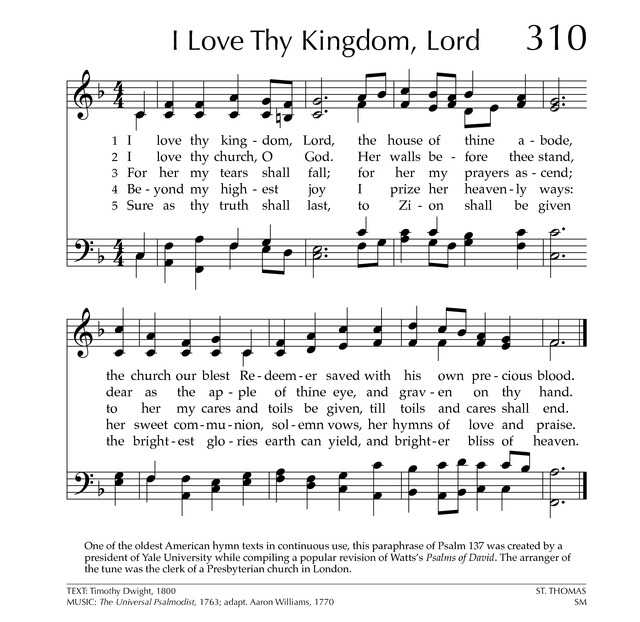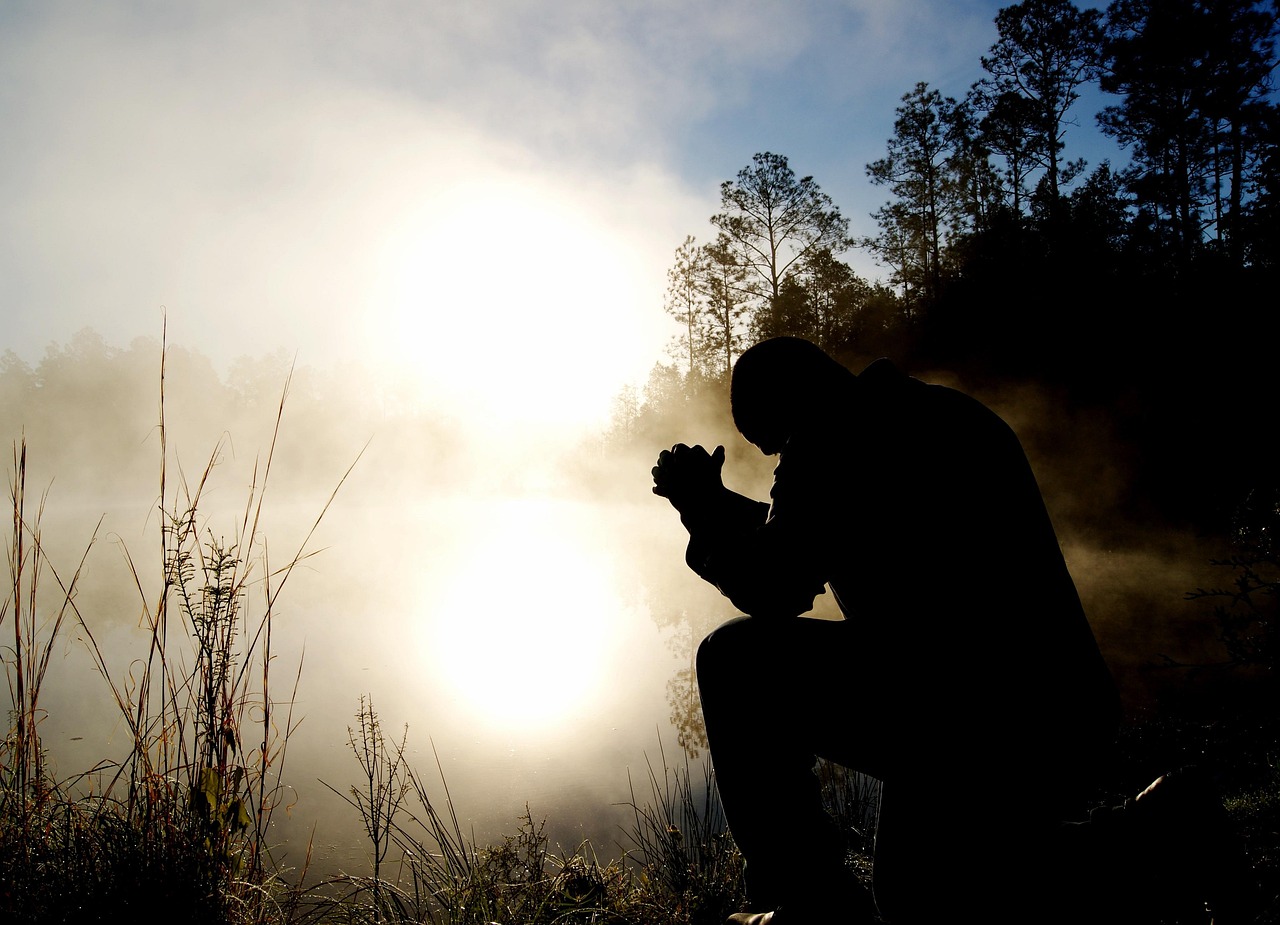I Love Thy Kingdom, Lord
By Timothy Dwight
Lyrics
the house of Thine abode,
the church our blest Redeemer saved
with His own precious blood.
Her walls before Thee stand,
dear as the apple of Thine eye
and graven on Thy hand.
for her my prayers ascend;
to her my cares and toils be giv'n,
till toils and cares shall end.
I prize her heav'nly ways,
her sweet communion, solemn vows,
her hymns of love and praise.
to Zion shall be giv'n
the brightest glories earth can yield,
and brighter bliss of heav'n.
Bible Reference
Psalm 137:5,6
About This Hymn
"I Love Thy Kingdom, Lord" is a remarkable hymn that holds a unique distinction in American hymnody. It is the only hymn from the colonial era—spanning the time of the Pilgrim Fathers up to the early 19th century—that continues to be in regular use today. Often referred to as “one of the imperishable lyrics of the Christian Church,” this hymn stands as a testament to the enduring spiritual heritage of early America. Its text was written by Timothy Dwight (1752–1817), a distinguished figure in American religious, educational, and literary history, while the tune most commonly associated with it, “St. Thomas,” is attributed to Aaron Williams (1731–1776). The meter of the hymn is Short Meter (SM – 66.86), and it finds strong Scriptural grounding in Psalm 137:5–6 and Hebrews 10:24–25, the latter urging believers to “consider one another to provoke unto love and to good works: not forsaking the assembling of ourselves together.”
Timothy Dwight was born in Northampton, Massachusetts, on May 14, 1752, into a family of deep spiritual heritage—his mother being the daughter of the renowned theologian and evangelist Jonathan Edwards. A precocious student, Dwight graduated from Yale College at the age of seventeen. His adult life was a portrait of versatile excellence and civic engagement. During the American Revolutionary War, he served as a chaplain under George Washington, demonstrating both his patriotism and his spiritual commitment. Following his military service, he embraced multiple vocations: Congregational minister, Connecticut state legislator, successful farmer, Yale faculty member, and ultimately President of Yale in 1795.
His presidency at Yale marked a spiritual and academic renaissance. At the time, the campus had been significantly influenced by Enlightenment skepticism, stemming from thinkers like Thomas Paine and Jean-Jacques Rousseau. When Dwight assumed leadership, only a handful of students identified as professing Christians. Yet through his powerful preaching and intellectual engagement, Dwight sparked a spiritual revival that began at Yale and extended to other college campuses in New England, reinvigorating Christian thought and devotion among the student body and faculty alike.
In 1797, Dwight undertook a significant editorial project: a revision of Isaac Watts’s Psalms and Hymns, to which he added thirty-three original texts, including the enduring hymn “I Love Thy Kingdom, Lord.” This hymnal enjoyed widespread adoption, particularly among Congregational and Presbyterian churches in New England, becoming a staple in worship for over three decades. The hymn expresses a deep affection for the Church—the visible kingdom of Christ on earth—and emphasizes the believer's loyalty and love for the body of Christ. Its words are heartfelt, and its theology deeply ecclesiastical, reflecting Dwight’s concern for cultivating love and unity among God's people.
Timothy Dwight was also a prolific writer beyond his hymns. His theological writings were highly influential, particularly his five-volume series titled Theology Explained and Defended, which provided a comprehensive defense of orthodox Christian doctrine. In response to the growing tide of skepticism and secularism in his day, he also wrote The Triumph of Infidelity, a sharp satire directed at the rationalist critics of Christianity. Another of his major contributions to American literature was his monumental Travels in New England and New York, published in four volumes. This work offered not only historical and geographical observations but also detailed insight into the social and economic conditions of the early American republic, making it an invaluable source for scholars and historians.
Despite his extensive contributions, Timothy Dwight’s achievements are all the more impressive considering his lifelong struggle with a severe visual impairment. After contracting smallpox, he suffered from chronic and debilitating eye pain that allowed him to read for no more than fifteen minutes a day. Yet, he pressed forward with scholarly vigor and unwavering faith, undeterred by his physical limitations. His perseverance in the face of adversity adds an inspiring depth to the hymns and writings he left behind.
The melody most commonly paired with this hymn, “St. Thomas,” has its own distinct history. It first appeared in Aaron Williams’s 1763 publication The New Universal Psalmodist. Williams, a music director and clerk at a Scottish Presbyterian Church in London, never claimed authorship of the tune. Because of this, many historians speculate that it may not have been entirely original but possibly adapted from the work of George Frideric Handel, especially given the stylistic similarities to compositions from Handel’s sacred repertoire, such as The Messiah. Regardless of its origins, the tune’s bright and majestic character perfectly complements the confident devotion expressed in Dwight’s lyrics. “St. Thomas” has also been used with other beloved hymns, including Isaac Watts’s “Come, We That Love the Lord,” further cementing its place in the legacy of Protestant hymnody.
In every way, “I Love Thy Kingdom, Lord” captures the essence of early American piety and love for the church. It reflects not only Timothy Dwight’s theological conviction and literary skill but also his pastoral heart for guiding believers toward faithfulness and unity. The hymn has endured for over two centuries, not simply because of its historical importance but because of its timeless truth: that the Church, despite her flaws and trials, is still the chosen vessel of God’s grace on earth and worthy of the believer’s love, service, and devotion.


📬 Subscribe to Our Devotional Updates
Receive weekly hymns, devotionals, and website features directly in your inbox.
Hymn Information

- Category: Hymn
- Author/Writer: Timothy Dwight (1800)
- Added: June 19, 2025
- Last Updated: June 19, 2025
- Views: 685
MIDI File
Recent Blog Posts
-
 How to Develop a Consistent Prayer Schedule
How to Develop a Consistent Prayer Schedule
Dec 11, 2025 -
 How to Forgive Someone Who Deeply Hurt You
How to Forgive Someone Who Deeply Hurt You
Dec 11, 2025 -

-
 Why Christmas Is Celebrated on December 25
Why Christmas Is Celebrated on December 25
Dec 11, 2025 -
 10 Most Renowned Hymn Writers
10 Most Renowned Hymn Writers
Dec 10, 2025
Visit Us on Social Media
Latest from X (Twitter)
Tweets by HymnalLibraryLatest from Facebook
Latest on YouTube
Daily Bible Verse
Disclaimer
The hymns, sheet music, MIDI files, and related content on this website are provided for educational and research purposes only.
- Public Domain: Many of the hymns featured here are in the public domain and may be freely used.
- Copyrighted Works: Some hymns may still be under copyright protection. Where applicable, permission has either been requested from the copyright owner, or the content is shared under the principles of fair use for educational purposes.
⚠️ Important Notice: If you wish to reproduce, distribute, or use any copyrighted hymn beyond personal study or educational use, you must obtain permission directly from the copyright holder. This website does not grant any rights for commercial use yet.
If there is any other question please address it to us in our Contact Page, for further assistance. Thank you for using the site. May God Bless You.